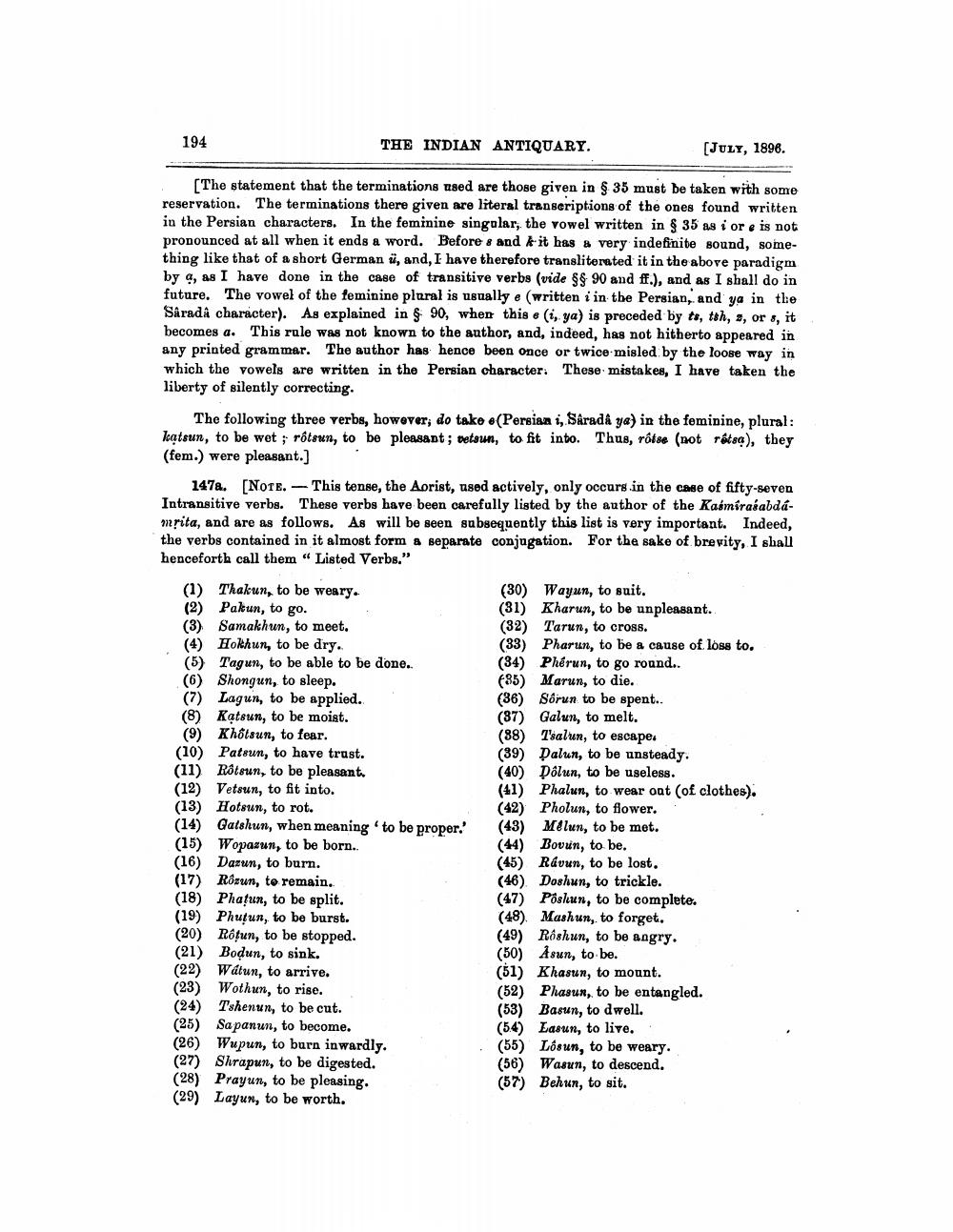________________
194
THE INDIAN ANTIQUARY.
(JULY, 1898.
[The statement that the terminations used are those given in 35 must be taken with some reservation. The terminations there given are literal transeriptions of the ones found written in the Persian characters. In the feminine singular, the vowel written in $35 as i ore is not pronounced at all when it ends a word. Before s and k it has a very indefinite sound, something like that of a short German ü, and, I have therefore transliterated it in the above paradigm by a, as I have done in the case of transitive verbs (vide $$ 90 and ff.), and as I shall do in future. The vowel of the feminine plural is usually e (written i in tbe Persian, and ya in the Sârada character). As explained in 90, when this e (i, ya) is preceded by ts, tsh, 2, or s, it becomes a. This role was not known to the author, and, indeed, has not hitherto appeared in any printed grammar. The author has hence been once or twice-misled by the loose way in which the vowels are written in the Persian character. These mistakes, I have taken the liberty of silently correcting.
The following three verbs, however, do take 6(Persian i, Sârada ya) in the feminine, plural: katsun, to be wot; rotsun, to be pleasant; detsun, to fit into. Thus, rôtse (not ratsa), they (fem.) were pleasant.]
147. Nore. This tense, the Aorist, used actively, only occurs in the case of fifty-seven Intransitive verbs. These verbs have been carefully listed by the author of the Kasmírasabdámrita, and are as follows. As will be seen subsequently this list is very important. Indeed, the verbs contained in it almost form a separate conjugation. For the sake of brevity, I shall henceforth call them "Listed Verbs." (1) Thakun, to be weary.
(30) Wayun, to suit. (2) Pakun, to go.
(31) Kharun, to be unpleasant. (3) Samakhun, to meet.
(32) Tarun, to cross. (4) Hokhun, to be dry.
(33) Pharun, to be a cause of loss to. (5) Tagun, to be able to be done..
(34) Phêrun, to go round.. (6) Shongun, to sleep.
(35) Marun, to die. (7) Lagun, to be applied.
(36) Sôrun to be spent.. (8) Katsun, to be moist.
(37) Galun, to melt. (9) Khôtsun, to fear.
(88) Tsalrn, to escape. (10) Patsun, to have trust.
(39) Palun, to be unsteady. (11) Rôtsun, to be pleasant.
(40) Dolun, to be useless. (12) Vetsun, to fit into.
(41) Phalun, to wear oat (of clothes). (13) Hotsun, to rot.
(42) Pholun, to flower. (14) Gatshun, when meaning to be proper.' (43) Melun, to be met. (15) Wopazun, to be born..
(44) Bovun, to be. (16) Dazun, to burn.
(45) Rávun, to be lost. (17) Rôzun, to remain.
(46) Doshun, to trickle. (18) Phatun, to be split.
(47) Pöskun, to be complete. (19) Phutun, to be burst.
(48) Mashun, to forget. (20) Rótun, to be stopped.
(49) Rôshun, to be angry. (21) Bodun, to sink.
(50) Åsun, to be. (22) Wátun, to arrive.
(51) Khasuun, to mount. (23) Wothun, to rise.
(52) Phasur, to be entangled. (24) Tshenun, to be cut.
(53) Basun, to dwell. (25) Sa panun, to become.
(54) Lasun, to live. (26) Wupun, to burn inwardly.
(55) Lôsun, to be weary. (27) Shrapun, to be digested.
(56) Wasun, to descend. (28) Prayun, to be pleasing.
(57) Behun, to sit. (29) Layun, to be worth.




